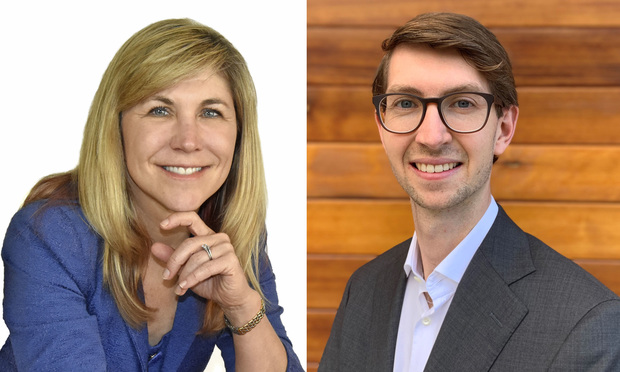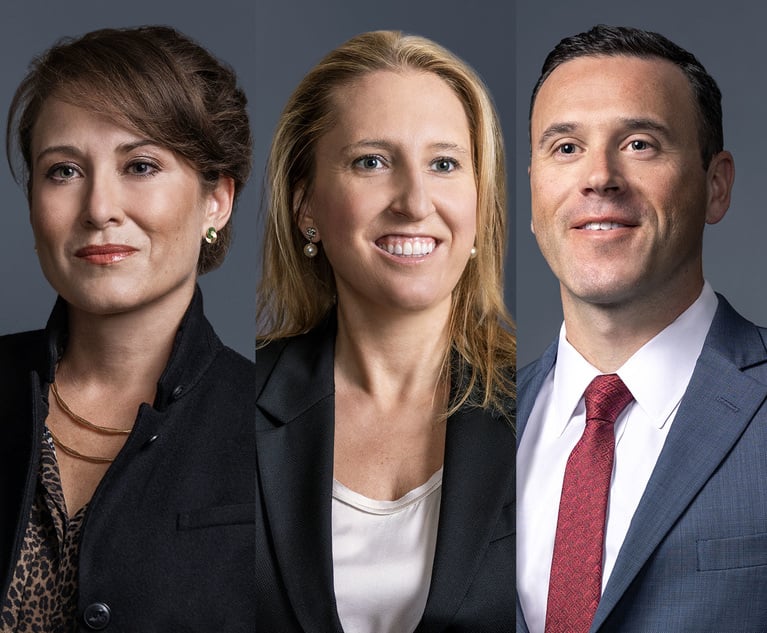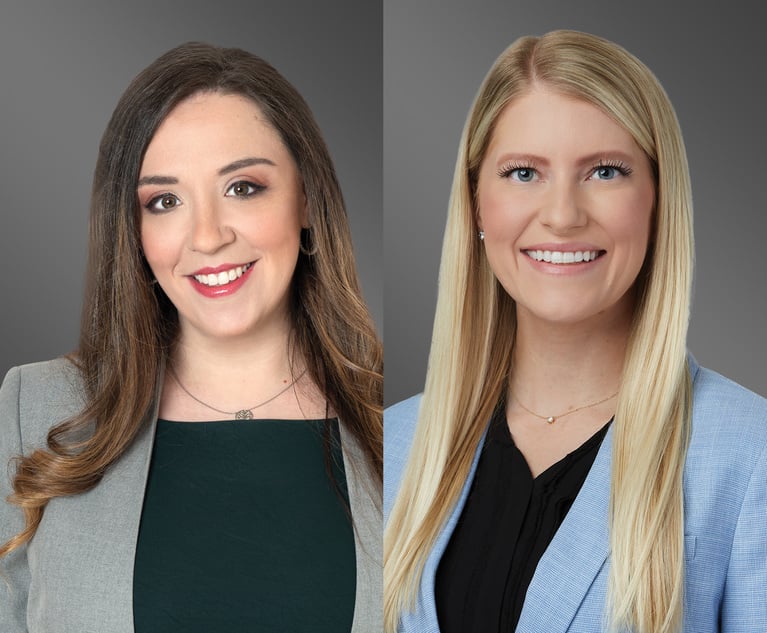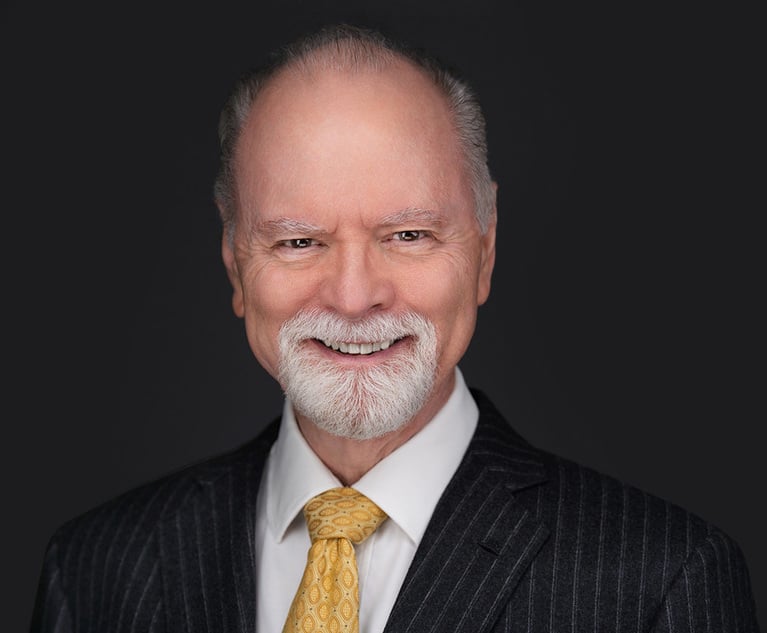How Privacy Laws Shape COVID-19 Reopening Plans
When it comes to processing personal information, Americans do not have a general right to privacy because the United States does not have a comprehensive privacy law.
May 14, 2020 at 09:01 AM
8 minute read
 Mary Fuller, left, and Justin Eichenberger, right.
Mary Fuller, left, and Justin Eichenberger, right.
Two weeks ago you were furloughed from your job in San Francisco. You're still on the company's health care plan—but are struggling to pay rent, and are worried that these health benefits will vanish if your employer goes out of business.
During a Zoom call with your friend in Milan, she tells you that the Italian government may issue "Immunity Certificates" that would allow people who have recovered from COVID-19 (and are probably immune from further infection) to return to work. You respond that the U.S. reopening plans, under current CDC guidance and California's Roadmap, require employers to conduct regular health checks on employees and visitors. While both countries want to safely reopen their economies, they will likely allocate screening responsibilities differently—with substantial effect on privacy.
Which privacy rights can you and your Italian friend expect? Isn't privacy a fundamental right in both countries? Isn't health data personally identifiable information that privacy laws are supposed to protect? In the United States, are employers really allowed to perform or require medical examinations?
Your friend tells you that privacy is more highly prized (and more tightly regulated) in Europe. Therefore, medical screenings by employers—a strategy widely relied on in China and part of most reopening plans in the United States—is not a viable option across much of Europe.
Privacy must be balanced against other fundamental rights
While the EU considers privacy to be a fundamental right (and the United States considers it to be important) this right is not absolute. It must be balanced against freedom of speech, the right to life, and other fundamental rights. For instance, your privacy rights don't prevent the TSA from searching you (and your luggage) before a flight. You could, of course, refuse to be screened, but if you did, you would not be able to fly. With COVID-19, a similar balance must be struck between individual privacy and public health.
COVID-19, your employer, and the right to privacy
When it comes to processing personal information, Americans do not have a general right to privacy because the United States does not have a comprehensive privacy law. Rather, the United States has a sectoral approach to privacy and only some types of personal information—such as health data or information relating to children or disabilities—receive protection under federal privacy laws. Also, most privacy laws only apply to certain "covered entities." Take HIPAA, the main privacy law regulating health data, as an example. Employers are not considered a covered entity (and thus do not have to comply with HIPAA's strict privacy and security rules), even when collecting sensitive health information such as results of COVID-19 medical examinations.
That does not mean, however, that employers are not subject to other privacy requirements. Employers do have to comply with the ADA, which governs their ability to ask for medical exams. Generally, a mandatory medical exam must be "job related and consistent with business necessity." Current ADA guidance makes clear that "employers may take steps to determine if employees entering the workplace have COVID-19 because an individual with the virus will pose a direct threat to the health of others." Thus, employers are authorized to ask and screen for COVID-19 symptoms as long as it is consistent with advice from the CDC and public health authorities and some privacy rules are adhered to. Employers must keep information relating to all medical examinations confidential and maintain such information in medical files that are kept separately from general employee records. Clearly, these privacy protections are not very extensive. On a related note, the federal privacy standards for COVID-19 testing sites are even lower because the U.S Department of Health and Human Services has waived all HIPAA rules for COVID-19 testing sites that are acting in good faith. As a result, none of the strict HIPAA privacy and security requirements will be enforced at those sites. Given this turn of events, it is unclear what privacy protections American residents might expect at COVID-19 testing centers.
Even California, which has the strictest privacy laws in the United States, offers little privacy protection to employees. Almost presciently, due to an October 2019 amendment to the California Consumer Privacy Act (CCPA), even these laws whose restrictive provisions came into effect on January 1, 2020, will not apply to employers or protect employees until January 2021. Until next year, companies will not have to comply with the CCPA when it comes to employee data, with two exceptions: first, employers must have reasonable security measures in place to safeguard personal information, and second, they must disclose the categories of personal information they collect about employees and job applicants, along with the business purposes for using such personal information.
In combination with existing federal requirements, this delay in the implementation of the CCPA means that California employers may ask for or conduct health examinations as long as they: (1) disclose the types of personal information that they collect (and identify the reason it is collected); (2) keep the results of medical examinations confidential; (3) store them separately from that individual's general employee records; and (4) use security measures to safeguard the personal information.
European GDPR grants greater personal privacy rights, but reduces government flexibility in response to COVID-19
While the United States is effectively waiving privacy laws in response to COVID-19, the current pandemic does not exempt European government agencies, public organizations, or private companies from adhering to the GDPR's extensive data protection framework. Health data is considered "sensitive data" under the GDPR, and lawful processing of such data requires the presence of one of the following four criteria to be met: (1) employment law rights and obligations; (2) explicit consent; (3) health (occupational medicine); and (4) public health. The last two grounds for lawful processing are not applicable to most employers because health and public health exceptions may only be relied on if a qualified health professional is involved. Thus, this exception will likely not be available for most employers. Explicit consent will not satisfy the statutory requirement since valid consent requires that the refusal of such consent does not disadvantage the employee.
Thus, employment law rights and obligations will, in most cases, be the only ground that allow an employer to require medical exams. It is important to note, however, that employment law falls under the competencies of the individual member states and differs significantly across the EU. Thus, employers must also check local laws and guidance from respective national data protection authorities.
Your friend in Milan is unlikely to get tested at work, because Italy (and other countries such as Belgium, France, and Hungary), determined that workplace driven health checks are incompatible with existing data protection laws. Even in countries with more permissive national employment laws, the bar remains high. Under the GDPR, the processing of health data must be necessary in order to comply with national statutory obligations. As a result, government entities will likely play a more pivotal role in Europe with regards to processing personal data relating to COVID-19 given that Chinese (and likely American) levels of employer testing would not meet the legal test in most EU member states. In that sense, government-issued "Immunity Certificates" might be the government's preferred alternative for Italy.
Where would you feel more comfortable?
Cultural norms and privacy laws have direct impact on governments' reopening plans. Europe's strict data protection regime protects the privacy of its residents but inhibits the flexibility of these governments to rapidly respond to COVID-19. Most European governments will not be able to rely on employers to conduct or require medical examinations of employees. Meanwhile, federal and local governments in the United States have more leeway when designing their COVID-19 response plans. This flexibility comes at the cost of residents' privacy rights. The short and long-term impacts of either strategy remain to be seen. Which response would you choose?
Justin Eichenberger will receive an LL.M. from Santa Clara University in May 2020. He has a bachelor's and master's degree in Law and Economics from the University of St. Gallen, Switzerland (Swiss J.D. equivalent). Justin has prior work experience as a financial analyst at Swiss Re and as a consultant at KPMG. He is passionate about privacy and holds the CIPP/E and CIPP/US certifications. Justin currently works as a legal intern for Benetech and GoPro, and is open to full-time opportunities.
Mary A. Fuller is principal at Fuller Tech Law in Silicon Valley. With decades of experience as an engineer, patent attorney, general counsel and corporate advisor, Mary provides intellectual property and fractional general counsel services for growth-minded technology companies. She also serves as an adjunct lecturer and supervising attorney at Santa Clara University School of Law's Entrepreneurs' Clinic, where students provide pro-bono legal services to high-tech startups.
This content has been archived. It is available through our partners, LexisNexis® and Bloomberg Law.
To view this content, please continue to their sites.
Not a Lexis Subscriber?
Subscribe Now
Not a Bloomberg Law Subscriber?
Subscribe Now
NOT FOR REPRINT
© 2025 ALM Global, LLC, All Rights Reserved. Request academic re-use from www.copyright.com. All other uses, submit a request to [email protected]. For more information visit Asset & Logo Licensing.
You Might Like
View All
M&A Transactions and AB 1824: Navigating New Privacy Compliance Challenges
7 minute read
What Will It Mean in California if New Federal Anti-SLAPP Legislation Passes?
9 minute readTrending Stories
- 1Uber Files RICO Suit Against Plaintiff-Side Firms Alleging Fraudulent Injury Claims
- 2The Law Firm Disrupted: Scrutinizing the Elephant More Than the Mouse
- 3Inherent Diminished Value Damages Unavailable to 3rd-Party Claimants, Court Says
- 4Pa. Defense Firm Sued by Client Over Ex-Eagles Player's $43.5M Med Mal Win
- 5Losses Mount at Morris Manning, but Departing Ex-Chair Stays Bullish About His Old Firm's Future
Who Got The Work
J. Brugh Lower of Gibbons has entered an appearance for industrial equipment supplier Devco Corporation in a pending trademark infringement lawsuit. The suit, accusing the defendant of selling knock-off Graco products, was filed Dec. 18 in New Jersey District Court by Rivkin Radler on behalf of Graco Inc. and Graco Minnesota. The case, assigned to U.S. District Judge Zahid N. Quraishi, is 3:24-cv-11294, Graco Inc. et al v. Devco Corporation.
Who Got The Work
Rebecca Maller-Stein and Kent A. Yalowitz of Arnold & Porter Kaye Scholer have entered their appearances for Hanaco Venture Capital and its executives, Lior Prosor and David Frankel, in a pending securities lawsuit. The action, filed on Dec. 24 in New York Southern District Court by Zell, Aron & Co. on behalf of Goldeneye Advisors, accuses the defendants of negligently and fraudulently managing the plaintiff's $1 million investment. The case, assigned to U.S. District Judge Vernon S. Broderick, is 1:24-cv-09918, Goldeneye Advisors, LLC v. Hanaco Venture Capital, Ltd. et al.
Who Got The Work
Attorneys from A&O Shearman has stepped in as defense counsel for Toronto-Dominion Bank and other defendants in a pending securities class action. The suit, filed Dec. 11 in New York Southern District Court by Bleichmar Fonti & Auld, accuses the defendants of concealing the bank's 'pervasive' deficiencies in regards to its compliance with the Bank Secrecy Act and the quality of its anti-money laundering controls. The case, assigned to U.S. District Judge Arun Subramanian, is 1:24-cv-09445, Gonzalez v. The Toronto-Dominion Bank et al.
Who Got The Work
Crown Castle International, a Pennsylvania company providing shared communications infrastructure, has turned to Luke D. Wolf of Gordon Rees Scully Mansukhani to fend off a pending breach-of-contract lawsuit. The court action, filed Nov. 25 in Michigan Eastern District Court by Hooper Hathaway PC on behalf of The Town Residences LLC, accuses Crown Castle of failing to transfer approximately $30,000 in utility payments from T-Mobile in breach of a roof-top lease and assignment agreement. The case, assigned to U.S. District Judge Susan K. Declercq, is 2:24-cv-13131, The Town Residences LLC v. T-Mobile US, Inc. et al.
Who Got The Work
Wilfred P. Coronato and Daniel M. Schwartz of McCarter & English have stepped in as defense counsel to Electrolux Home Products Inc. in a pending product liability lawsuit. The court action, filed Nov. 26 in New York Eastern District Court by Poulos Lopiccolo PC and Nagel Rice LLP on behalf of David Stern, alleges that the defendant's refrigerators’ drawers and shelving repeatedly break and fall apart within months after purchase. The case, assigned to U.S. District Judge Joan M. Azrack, is 2:24-cv-08204, Stern v. Electrolux Home Products, Inc.
Featured Firms
Law Offices of Gary Martin Hays & Associates, P.C.
(470) 294-1674
Law Offices of Mark E. Salomone
(857) 444-6468
Smith & Hassler
(713) 739-1250








